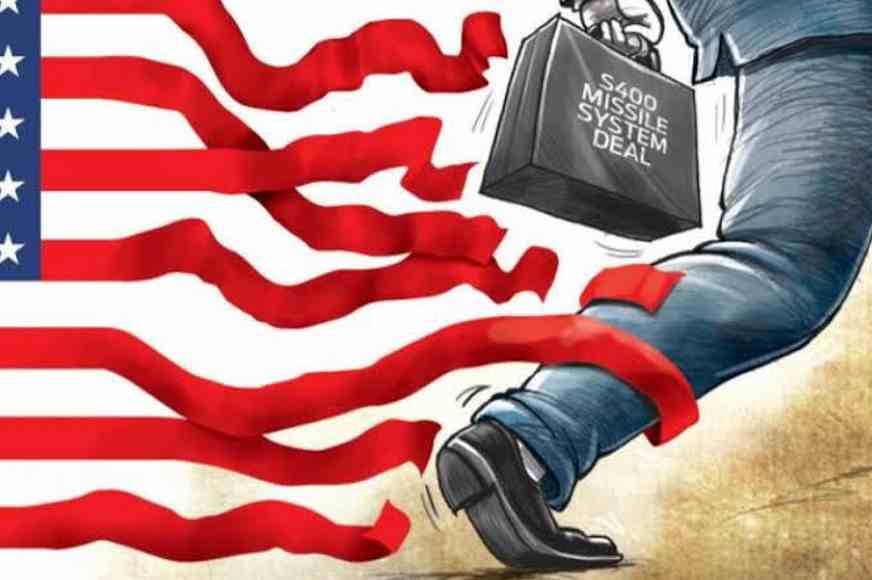
Countering America’s Adversaries Through Sanctions Act (CAATSA)
- The CAATSA Or countering America’s Adversaries Through Sanctions Act is a United States federal law that forced sanctions on Iran, North Korea, and Russia. The bill was passed by the smaller upper assembly senate on 27 July 2017, after it passed house 419. The bill was signed into law on 2 August 2017 by President Donald Trump, who said that he believed the legislation was seriously weak and imperfect. This act prevents trade partners of the United States from entering into bilateral contracts with these three nations. India has commercial and defensive contracts with Iran and Russia, the CAATSA does have an impact on India’s foreign policy.
Updates On (CAATSA)

- According to the recent updates a legislative amendment that grants India relief from America’s rough and severe CAATSA sanctions in exchange for its possession of the S-400 missile defense system from Russia to help prevent attackers like China has been approved by the US House of Representatives by voice vote.
- The legislation was approved on July 14, 2022, during floor discussion of the National Defence Authorization Act as a part of a bloc (all together as a single unit) amendment (NDAA).
- Previously, in agreement with the CAATSA, the US has already imposed sanctions on Turkey for its acquisition of several Russian-made S-400 missile defense systems.
- Following the US sanctions on Turkey over acquiring S-400 missile systems, there were concerns that Washington may impose similar severe punishment measures on India.
- The legislation says that the United States and India Initiative on Critical and Emerging Technologies (ICET) is a welcome and essential step to developing closer partnerships between governments, academia, and industry in the two countries to address the latest advances in artificial intelligence, quantum computing, biotechnology, aerospace, and semiconductor manufacturing.
Background Of CAATSA
- Russia’s Almaz Central Design Bureau created the S-400 Triumf Missile system is an anti-aircraft missile defense system. Triumf is Russian for Triumph. As India has prepared to purchase S-400 missile systems for Russia, they have frequently been in the news. However, the United States has voiced strong opposition, if not outright condemnation, to the proposal.
CAATSA Enacted
- The Countering America’s Adversaries Through Sanctions Act came against the scenery of the background of the three events that would have serious implications regarding geopolitics. They are as follows:
Iran’s Nuclear Missiles Program: The United States Government believed that any progress in Iran’s nuclear missile program would further destabilize the Middle East as Iran has repeatedly made threats against Israel, a key NATO, and United States ally. The CAATSA gives authority to the President of the United States to impose sanctions against any party involved in the sale and transfer of military technology to Iran.
Curbing Russian influence: The Russian annexation of Crimea in 2014 and allegations of interventions in the US polls of 2016 was the catalyst for the CAATSA against Russia. Under the act sanctions can be imposed on Russia should the state or private individuals be found involved in activities such as cybersecurity, crude oil projects, financial institutions, corruption, human rights abuses, etc
- North Korea and weapons of mass destruction: North Korea has a nuclear weapons military program and as of 2020 its estimated missile arsenal includes 30-40 warheads with enough fissile materials to produce 6-7 missiles per year. North Korea has made repeated threats against South Korea repeatedly and the United States.
- Previous administrations before had put sanctions against the North Korean dictatorship. But what makes the CAATSA different is that the bill modifies and increases the President’s authority to impose sanctions on persons in violation of certain United Nations Security Council resolutions regarding North Korea along with a wide range of other economic sanctions that can cripple the already fledgling North Korean economy.
Implication For India Regarding CAATSA

The India and United States relationship, especially when it comes to the defense aspect, has grown exponentially since 2008. At least by 2019, about $15 billion worth of weapons has been purchased by India. Historically, India also purchased its weapons and the subsequent comments from Russia since the days of the Cold War. Keeping this in mind United States lawmakers had specifically told the senate that the sanctions should not affect major defense partners such as India
The S-400 Triumf missile system, which has sophisticated skills to assess the distance from a target and conduct a surface-to-air missile attack, has been purchased by India. India paid US$ 5.5 billion for five of these systems in 2018, and their delivery started in November of that same year. They had been stationed in Punjab.
A waiver of such CAATSA for India had been under consideration since the law had come into force but little headway has been made in that regard. In fact, India was threatened with sanctions when it decided to buy the S-400 missile launchers from Russia and buy crude oil from Iran. What was worrisome for India was the example of Turkey who, despite being a key NATO ally, was expelled from the US F-35 fighter jet program when it purchased S-400 missile systems from Russia.
Yet India went ahead with the S-400 deal in 2018 with no negative reaction from the United States government. The delivery of the S-400s is expected to finish by 2025. Lately, the United States Government has stated that although a waiver is not possible at this time, a blanket application of sanctions against India for its defense contracts with Russia is also not being considered.
Why Is CAATSA Not Imposed In India
According to a report from March 2022, the US valued India as a vital ally in the region and India is currently a highly significant security partner of America.
India has always maintained an autonomous foreign policy. This also holds true for the defense supplies and purchases it makes, which are determined by the interests in national security.
India has maintained its neutrality and refused to join any of the sanctions on Russia put in place by Western nations, despite the ongoing turmoil in Ukraine and the US tightening its position against Russia.
India has previously made many references to the necessity for S-400 missiles for border defense against China.
Criticism Against CAATSA
The Countering America’s Adversaries Through Sanctions Act has been met with derisions from North Korea, Russia, and Iran. But the negative feeling has not only been restricted to the United State’s adversaries, but key partners such as the European Union have felt that the CAATSA sheds a negative light on United States-European relations as many of them have gas line projects signed with Russia.
Geopolitical think tanks have argued that the CAATSA will hamper the United States Asian allies in resisting a rising Chinese influence. Another implication is that this would also discourage other nations from building a defensive relationship with the United States with a view to avoiding any future compromises regarding strategic autonomy. These experts believe that if the CAATSA is implemented haphazardly, it could eventually backfire on United States policy soon.
Legislative History

On 15 June 2017, the United States Senate voted 98 to 2 for the bill (an amendment to underlying Iran sanctions bill), which was rooted in a bill introduced in January that year by a bipartisan group of senators over Russia’s continued involvement in the wars in Ukraine and Syria and its interference in the year 2016 election with regard to Russia, the bill was designed to expand the punitive measures previously imposed by executive orders and convert them into law. The bill in the Senate incorporated the provisions of the Countering Russian Influence in Europe and Eurasia Act that was introduced in May 2017 by Senator Ben Cardin.
An identical bill was introduced by Democrats in the House of Representatives on 12 July 2017. While the bill’s text was unchanged from what had passed the Senate on 15 June, it was titled as House legislation to avoid procedural hurdles. The bill, after being revised to address some of the Trump administration’s concerns, passed in the House 419 to 3 on 25 July. On 27th July, the bill was passed overwhelmingly by the Senate, 98 to 2. Both votes are veto-proof majorities.
On 2 August 2017, President Donald Trump signed the bill into law, while stating that he believed the legislation was “seriously flawed”.
Provision
1. Countering Iran’s Destabilizing Activities Act of 2017:-
This bill directs the Departments of State, Defense, and Treasury and the Director of National Intelligence to submit a strategy every two years for deterring conventional and asymmetric Iranian activities that threaten the United States and key allies in the Middle East, North Africa, and beyond.
The President shall impose asset blocking and U.S. exclusion sanctions against any person that materially contributes to:
- Iran’s ballistic missile or weapons of mass destruction programs, or
- the sale or transfer to Iran of specified military equipment or the provision of related technical or financial assistance.
The President shall impose against Iran’s Islamic Revolutionary Guard Corps and affiliated foreign persons sanctions with respect to blocking property of, and prohibiting transactions with, foreign persons who commit or support terrorism.
The President may impose asset-blocking sanctions against any person identified by the State Department as responsible for extrajudicial killings, torture, or other gross violations of internationally recognized human rights committed against certain individuals in Iran.
The bill requires specified existing sanctions against persons for materially contributing to Iran’s ballistic missile program or for supporting Iran’s acts of international terrorism to continue until 90 days after the President certifies that such activities ceased during the immediately preceding three-month period.
The bill exempts certain humanitarian and national security activities from sanctions.
The President may temporarily waive the imposition or continuation of sanctions under specified circumstances.
The bill sets forth reporting requirements with respect to:
- persons contributing to Iran’s ballistic missile program,
- U.S.-European Union sanctions coordination,
- U.S. citizens detained by Iran, and
- each use of the waiver authority.
2. Countering Russian Influence in Europe and Eurasia Act of 2017:-
The President must submit for congressional review certain proposed actions to terminate or waive sanctions with respect to the Russian Federation.
Specified executive order sanctions against Russia shall remain in effect.
- The President may waive specified cyber- and Ukraine-related sanctions. The bill provides sanctions for activities concerning
- cyber security,
- crude oil projects,
- financial institutions,
- corruption,
- human rights abuses,
- evasion of sanctions,
- transactions with Russian defense or intelligence sectors,
- export pipelines,
- privatization of state-owned assets by government officials, and
- arms transfer to Syria.
The Department of State shall work with the government of Ukraine to increase Ukraine’s energy security.
The bill:
- directs the Department of the Treasury to develop a national strategy for combating the financing of terrorism, and
- includes the Secretary of the Treasury on the National Security Council.
3. Korean Interdiction and Modernization of Sanctions Act:-
This bill amends the North Korea Sanctions and Policy Enhancement Act of 2016 to direct the President to designate and subject to specified sanctions under such Act any person who knowingly:-
The purchases or acquires from North Korea any significant amounts of gold, titanium ore, vanadium ore, copper, silver, nickel, zinc, or rare earth minerals.
The sales or transfers to North Korea any significant amount of rocket, aviation, or jet fuel, except for certain use by civilian passenger aircraft outside North Korea.
They provide significant amounts of fuel or supplies or facilitate a significant transaction to operate or maintain a vessel or aircraft that is designated under an applicable executive order or an applicable United Nations Security Council resolution.
The insures or registers a vessel owned or controlled by the government of North Korea, except as approved by the Security Council; or
- They maintain a correspondent account with any North Korean financial institution, except as approved by the Security Council.
Domestic Reactions
- On the day President Trump signed the bill into law, he issued two separate, simultaneous signing statements. In the statement meant for Congress, he said he will take tough measures to punish and deter aggressive and destabilizing behavior by Iran, North Korea, and Russia, this legislation is significantly flawed. In its haste to pass this legislation, Congress included several clearly unconstitutional provisions” — such as restrictions executive branch’s authority that limited its flexibility in foreign policy.
1. State Department
- U.S. State Department spokeswoman stated: “Since the enactment of the CAATSA legislation, we estimate that foreign governments have abandoned planned or announced purchases of several billion dollars in Russian defense acquisitions. Given the long timeframes generally associated with major defense deals, the results of this effort are only beginning to become apparent Secretary of State Mike Pompeo warned Egypt against purchasing the Russian Sukhoi-Su-35, saying “We’ve made clear that if those systems were to be purchased, the CAATSA statute would require sanctions on the regime.
2. Defense Department
- Assistant Secretary of Defence said that they understand the historical India-Russia relationship but on CAATSA they did plea for an exception for India, but they guarantee a waiver will be used for future purchases.
International Reactions
India
In October 2018, India inked a billion deal with Russia to procure four S-400 Triumf surface-to-air missile defense systems while ignoring the CAATSA. The U.S. threatened India with sanctions over India’s decision to buy the S-400 missile defense systems from Russia. According to the President of the U.S.-India Strategic Partnership Forum (USISPF), Mukesh Aghi: Critics who think that India should avoid the S-400 purchase misread the situation. Simply put, sanctions would have a disastrous effect on U.S and India for decades to come. In India’s eyes, the United States would once again be regarded as untrustworthy. Sanctions would push India closer to Russia at a time when India is reeling from the decision to withdraw from the Iran deal—Iran is India’s third largest supplier of crude oil.
Two oil companies ordered crude oil from Iran for November ignoring CAATSA. The United States threatened India with sanctions over India’s decision to buy oil from Iran.
On 15 July 2022, the United state House of Representatives passed a legislative amendment that granted India a waiver from CAATSA-related sanctions connected to the purchase of the S-400; however, the amendment is yet to pass by the United State Senate.
Top 13 Interesting Facts About CAATSA
The United States House of Representatives has approved an amendment to the National Defence Authorization Act (NDAA) proposing India- specific waiver under countering America Adversaries Through Sanctions Act (CAATSA).
It will allow India to freely purchase Russia’s S-400 missile system without the fear of American sanctions.
The Russian Government has agreed to deliver the first regimental set of S-400 Triumf SA-21 Growler Air Defence System to India. India and Russia have signed a 5.43 billion USD contract on the defense system. The NATO reporting name of the defense system is SA-21 Growler. About S-400 Triumf SA-21 Growler It is long-range.
The United States recently imposed sanctions on Turkey under section 231 of the Countering America’s Adversaries Through Sanctions Act, CAATSA. The sanctions were imposed for buying a Russian-made S400 anti-missile system.
The Organisation of Petroleum Exporting Countries (OPEC) and Russia have come together to cut oil output by 10%. This is being done to control the falling oil prices amidst lock down all over the world due to COVID-19. Background The Russian Government earlier refused to sign the deal when Saudi Arabia initiated production cuts.
On March 9, 2020, the prices of crude oil plunged by 20% after OPEC to failed to make a deal in making production cuts. Highlights Saudi Arabia and its major allies like Kuwait, Iraq, and UAE initiated to make a deal at the OPEC to reduce the production of oil.
India and Russia have signed 14 MoUs during the DefExpo 2020. It included land, air, naval, and other hi-tech civilian products. With the agreements signed the Defence trade between the countries is to cross 16 billion USD. Highlights The trade of 16 billion USD between the countries includes S400 missiles, Kamov helicopters, and Kalashnikov rifles.
This Sanction act is mostly associated with Russia, North Korea, and Iran. CAATSA implementation over India is also linked to India’s armament purchasing power from Russia and other countries. The entire sanction legislation is concerned with measuring international political relations. India has been ordered to stop purchasing weapons from Russia and other countries; otherwise, India will be blamed. Even in a ground fight involving China and India within the LAC, they were advised to refrain from purchasing weapons from Russia and to include this CAATSA sanction to manage a better international relationship, but India did not listen to America in this regard.
There was a deal of buying a jet fighter from Russia associated with India and for this USA still takes their valuable position within the CAATSA.
21 MiG-29 fighter planes and their procurement were approved for India by The Defense Acquisition Council. This upgraded Russian weapon buying process is associated with the acquisition process related to MKI aircraft.
In terms of purchasing the S-400 missile from Russia, the sanction process of the USA’s CAATSA and its consequences are constricted by government regulation.
Under the Countering America’s Adversaries via Penalties Act (CAATSA), the US administration is required to impose sanctions on any country that has significant transactions with Iran, North Korea, or Russia.
North Korea’s military weapon distribution or nuclear program is one of the biggest threats to the whole world and that’s why it is necessary to control them for a better future with better international relationship management. North Korea and its missile threat over several countries can be restricted through the CAATSA sanction.






